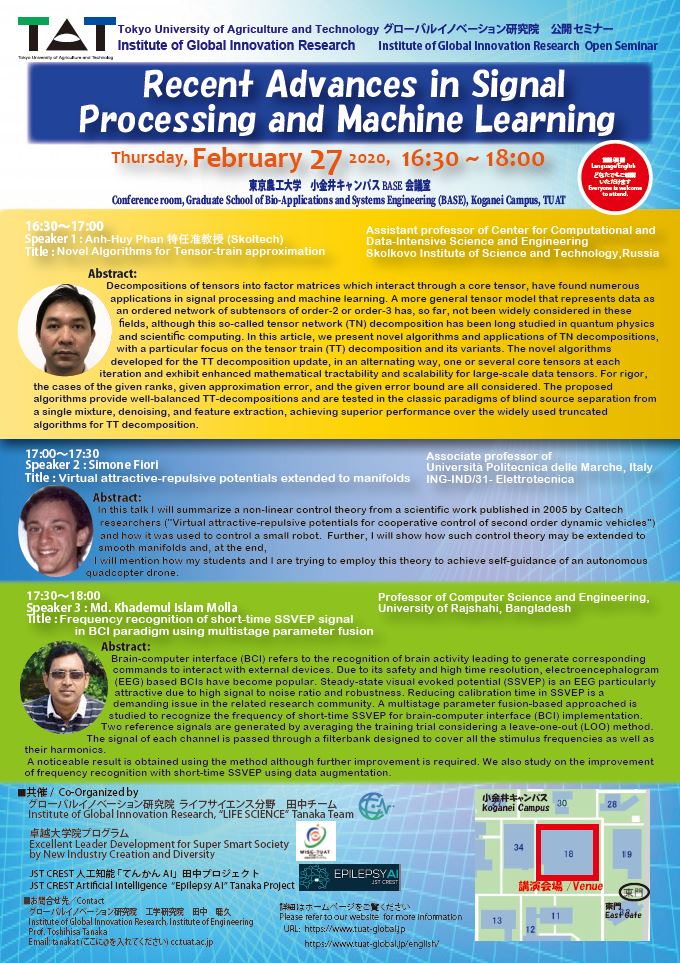Event
Online Seminar【GIR Open Seminar】 Dr. Anh-Huy Phan / Skolkovo Institute of Science and Technology (Russia) ”Recent Advances in Signal Processing and Machine Learning”

| Date | 2020.2.27 (16:30 - 18:00) |
|---|---|
| Venue | |
| Title | Please join via zoom or following dial number if your schedule permits. https://zoom.us/j/655497359 Meeting ID: 655 497 359 Dial +1 929 205 6099 U.S.A. (New York) +1 669 900 6833 U.S.A. (San Jose) +81 524 564 439 Japan +81 3 4578 1488 Japan Meeting ID: 655 497 359 『Recent Advances in Signal Processing and Machine Learning』 16:30~17:00 ◆Dr. Anh-Huy Phan (Assistant Professor, Center for Computational and Data-Intensive Science and Engineering, Skolkovo Institute of Science and Technology, Russia) "Novel Algorithms for Tensor-train approximation" 〈Abstract〉 Decompositions of tensors into factor matrices which interact through a core tensor, have found numerous applications in signal processing and machine learning. A more general tensor model that represents data as an ordered network of subtensors of order-2 or order-3 has, so far, not been widely considered in these fields, although this so-called tensor network (TN) decomposition has been long studied in quantum physics and scientific computing. In this article, we present novel algorithms and applications of TN decompositions, with a particular focus on the tensor train (TT) decomposition and its variants. The novel algorithms developed for the TT decomposition update, in an alternating way, one or several core tensors at each iteration and exhibit enhanced mathematical tractability and scalability for large-scale data tensors. For rigor, the cases of the given ranks, given approximation error, and the given error bound are all considered. The proposed algorithms provide well-balanced TT-decompositions and are tested in the classic paradigms of blind source separation from a single mixture, denoising, and feature extraction, achieving superior performance over the widely used truncated algorithms for TT decomposition. 17:00~17:30 ◆Dr. Simone Fiori (Associate professor, Università Politecnica delle Marche, Italy) "Virtual attractive-repulsive potentials extended to manifolds" 〈Abstract〉 In this talk I will summarize a non-linear control theory from a scientific work published in 2005 by Caltech researchers ("Virtual attractive-repulsive potentials for cooperative control of second order dynamic vehicles") and how it was used to control a small robot. Further, I will show how such control theory may be extended to smooth manifolds and, at the end, I will mention how my students and I are trying to employ this theory to achieve self-guidance of an autonomous quadcopter drone. 17:30~18:00 ◆Md. Khademul Islam Molla (Professor, Computer Science and Engineering, University of Rajshahi, Bangladesh) "Frequency recognition of short-time SSVEP signal in BCI paradigm using multistage parameter fusion" 〈Abstract〉 Brain-computer interface (BCI) refers to the recognition of brain activity leading to generate corresponding commands to interact with external devices. Due to its safety and high time resolution, electroencephalogram (EEG) based BCIs have become popular. Steady-state visual evoked potential (SSVEP) is an EEG particularly attractive due to high signal to noise ratio and robustness. Reducing calibration time in SSVEP is a demanding issue in the related research community. A multistage parameter fusion-based approached is studied to recognize the frequency of short-time SSVEP for brain-computer interface (BCI) implementation. Two reference signals are generated by averaging the training trial considering a leave-one-out (LOO) method. The signal of each channel is passed through a filterbank designed to cover all the stimulus frequencies as well as their harmonics. A noticeable result is obtained using the method although further improvement is required. We also study on the improvement of frequency recognition with short-time SSVEP using data augmentation. |
| Language | English |
| Intended for | Everyone is welcome to attend. |
| Co-Organized by | JST CREST Artificial Intelligence “Epilepsy AI” Tanaka Project Institute of Global Innovation Research, “LIFE SCIENCE” Tanaka Team Excellent Leader Development for Super Smart Society by New Industry Creation and Diversity |
| Outline | |
| Contact | Institute of Global Innovation Research, Institute of Engineering Prof. Toshihisa Tanaka Email: tanakat (at) cc.tuat.ac.jp |
このページの上部へ